In Short:
Vivy -Fluorite Eye’s Song- is a 13 episode anime created by Wit Studio in 2021. It tells the story of an android Artificial Intelligence nicknamed Diva who was created by humanity expressly for the purpose of singing. Her life takes an unexpected turn when an AI from the future named Matsumoto is sent back in time and demands she help him save humanity from a world ending AI uprising. To do so, Diva must overcome the limits of her personality and programming and assist Matsumoto by helping him interven in key historical events that will occur over the next one hundred years.
Suggested Watch Minimum: 2 episodes. Vivy – Fluorite Eye’s Song- is largely broken up into short, impactful miniature story arcs. It even debuted with its first two episodes shown back to back on the same day. If you try to judge this show just its first episode you will be quite literally cutting its first story in half. Really, though, I’d recommend you proceed to episodes three and four as they are some of the strongest in the series and give you more insight into the way the show skips large periods of time between its story arcs.
Full Review:
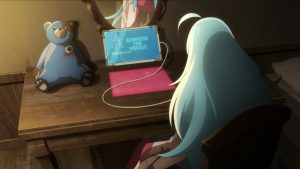 When I first heard about Vivy -Fluorite Eye’s Song- I was instantly intrigued by the premise, but was a bit unsure how it would turn out. It looked to me that it would be a bit too silly. The first trailer showed a pair of mismatched characters: A soft spoken songstress and her partner, a loud, fast talking AI trapped in a small robot teddy bear. I was afraid that the show would try too hard to be funny. Fortunately, that wasn’t the case. While the show does have some humor here and there, it is largely a serious sci-fi story that features great characters, tense situations, a very strong soundtrack with several outstanding songs sung by Diva and others, and some of 2021’s best art and animation.
When I first heard about Vivy -Fluorite Eye’s Song- I was instantly intrigued by the premise, but was a bit unsure how it would turn out. It looked to me that it would be a bit too silly. The first trailer showed a pair of mismatched characters: A soft spoken songstress and her partner, a loud, fast talking AI trapped in a small robot teddy bear. I was afraid that the show would try too hard to be funny. Fortunately, that wasn’t the case. While the show does have some humor here and there, it is largely a serious sci-fi story that features great characters, tense situations, a very strong soundtrack with several outstanding songs sung by Diva and others, and some of 2021’s best art and animation.
Characters
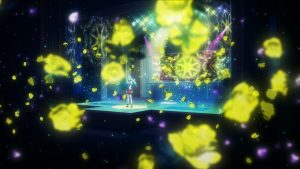 Our main character, A-035624, is a purpose built songstress AI nicknamed Diva whose only job it is to sing at a large theme park called NiaLand. When we first meet Diva she has only been active for a little over a year. She has a beautiful singing voice, but the world is still new to her and she is doing her best to puzzle her way through it. We learn that all of the many AIs humanity has created are each given a core mission upon activation. Diva is no exception. When she was first activated, she was told that her mission was to make everyone happy with her singing, and to do so she would need to learn to sing from her heart.
Our main character, A-035624, is a purpose built songstress AI nicknamed Diva whose only job it is to sing at a large theme park called NiaLand. When we first meet Diva she has only been active for a little over a year. She has a beautiful singing voice, but the world is still new to her and she is doing her best to puzzle her way through it. We learn that all of the many AIs humanity has created are each given a core mission upon activation. Diva is no exception. When she was first activated, she was told that her mission was to make everyone happy with her singing, and to do so she would need to learn to sing from her heart.
In her own quiet way, Diva is obsessed with her core mission given to her by the scientists and engineers who created her. She doesn’t rush towards it. It’s not even something that she needs to achieve anytime soon. Instead, it is a problem that she picks away at day after day. One of the first thing she realizes as a person is that doing anything from one’s heart is a difficult concept even for the humans around her. Over and over throughout the series, Diva will ask others, AIs and Humans alike, what it means to them to do something from their heart. Their answers will slowly shape Diva’s own answer to that question.
 Early in the first episode, we meet our second main character, Matsumoto, a cube-shaped AI sent back from a terrible future where a massive AI uprising is in the process of wiping out humanity. It is his mission to change that future by partnering with Diva and using the wealth of historical knowledge he was sent back with to help her alter a handful of key moments over the next one hundred years. Where Diva is quiet and contemplative and somewhat unsure of herself, Matsumoto proves to be a loud, fast talking, boisterous AI who is sure he is the best thing ever. Naturally, these two clash immediately. But for more reasons than just the ways they express themselves. The two approach difficult situations in fundamentally different ways.
Early in the first episode, we meet our second main character, Matsumoto, a cube-shaped AI sent back from a terrible future where a massive AI uprising is in the process of wiping out humanity. It is his mission to change that future by partnering with Diva and using the wealth of historical knowledge he was sent back with to help her alter a handful of key moments over the next one hundred years. Where Diva is quiet and contemplative and somewhat unsure of herself, Matsumoto proves to be a loud, fast talking, boisterous AI who is sure he is the best thing ever. Naturally, these two clash immediately. But for more reasons than just the ways they express themselves. The two approach difficult situations in fundamentally different ways.
Matsumoto’s way of doing things is to achieve the best possible outcome as soon as possible using the most efficient means currently available. If his records of history say that a government official is known to have committed some huge tragedy, he might calculate that the best way to prevent that tragedy will be to eliminate that official. Diva, though, is less sure about her place in the world, and is prone to taking a more compassionate approach. She would rather try and understand why a terrible event occurred in the hopes of defusing the situation without having to take more extreme measures. This always comes back to her core mission. Anyone she is forced to kill, anyone she must sacrifice for the greater good, is someone who she can’t make happy with her singing.
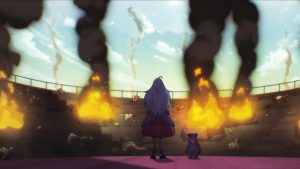 To Diva, saving the world is not something she was designed to do. It is not something she wants to do. Matsumoto has to frame things in a way that leave her no real choice but to help him. Even then, Diva is highly protective of her core mission to sing and make people happy. At one point early on she angrily refuses a software upgrade Matsumoto attempts to give her because she is afraid it might disrupt her ability to sing. To Matsumoto, singing has nothing to do with his mission of saving the world. He is flabbergasted that Diva would put herself, and his mission, at risk for something as inconsequential as singing.
To Diva, saving the world is not something she was designed to do. It is not something she wants to do. Matsumoto has to frame things in a way that leave her no real choice but to help him. Even then, Diva is highly protective of her core mission to sing and make people happy. At one point early on she angrily refuses a software upgrade Matsumoto attempts to give her because she is afraid it might disrupt her ability to sing. To Matsumoto, singing has nothing to do with his mission of saving the world. He is flabbergasted that Diva would put herself, and his mission, at risk for something as inconsequential as singing.
The differing approaches of these two characters quickly forces them into an uneasy compromise. Matsumoto agrees to leave Diva to her singing as long as her goals don’t affect his mission to save the world. From her end, Diva rationalizes that helping Matsumoto complete his mission to save humanity is in line with her mission of making people happy by singing to them. If everyone dies in the coming AI uprising, there will be no one left to sing to. Diva and Matsumoto frequently bicker and argue throughout the series, each coming from their own point of view, but over time and through the course of some dramatic events, their unfriendly truce slowly evolves into something much more solid.
Stories
 The second core strength of Vivy -Fluorite Eyes Song- is the stories it tells and the way its episodes are structured. Instead of being one long story, the show divides itself up into a handful of smaller stories that play out largely separate from each other over the next one hundred years. The initial two episode story takes place in the year we met Diva. The next one takes place fifteen years later. The next one several years after that. And so on. One of the interesting things about this show is how much we don’t see. For Matsumoto, these long stretches of time go by in an instant. He was sent back to fix key moments in history. The rest of the time he simply shuts down and is inactive for spans of years or decades in order to prevent making inadvertent changes to future events.
The second core strength of Vivy -Fluorite Eyes Song- is the stories it tells and the way its episodes are structured. Instead of being one long story, the show divides itself up into a handful of smaller stories that play out largely separate from each other over the next one hundred years. The initial two episode story takes place in the year we met Diva. The next one takes place fifteen years later. The next one several years after that. And so on. One of the interesting things about this show is how much we don’t see. For Matsumoto, these long stretches of time go by in an instant. He was sent back to fix key moments in history. The rest of the time he simply shuts down and is inactive for spans of years or decades in order to prevent making inadvertent changes to future events.
For Diva, her mission to learn how to sing from her heart continues on during the months, years, and decades that Matsumoto is powered down. One of the things the anime does well is show how the short amount of time Diva spends with Matsumoto during each mission help shape her evolution as a person and a singer. So, while we don’t see the years in between from either character’s perspective, when we rejoin Diva after each time skip we get to see how much she has grown and changed and improved. Sometimes the changes are subtle, other times the changes are shockingly dramatic.
 Looking beyond Diva’s personal story, the show largely revolves around four distinct missions Matsumoto brings to Diva, each with its own small cast of new characters and impactful events. All four stories are their own little mystery. Matsumoto has detailed historical records of what originally happened leading up to the AI uprising, but it very quickly becomes clear that the news reports and social media chatter recorded by history didn’t always capture the full behind-the-scenes details of the events he and Diva are trying to alter. Each of these stories have some truly great characters beyond our main pair. They also have some shocking twists and cliffhangers that had me gasping in awe and wishing the next episode would hurry up and come so I could see the conclusions. There’s quiet scenes. There’s action scenes. There’s bittersweet joy. There’s meaningful despair. Matsumoto tells Diva early on that her next one hundred years won’t be easy, and he is right, they truly aren’t
Looking beyond Diva’s personal story, the show largely revolves around four distinct missions Matsumoto brings to Diva, each with its own small cast of new characters and impactful events. All four stories are their own little mystery. Matsumoto has detailed historical records of what originally happened leading up to the AI uprising, but it very quickly becomes clear that the news reports and social media chatter recorded by history didn’t always capture the full behind-the-scenes details of the events he and Diva are trying to alter. Each of these stories have some truly great characters beyond our main pair. They also have some shocking twists and cliffhangers that had me gasping in awe and wishing the next episode would hurry up and come so I could see the conclusions. There’s quiet scenes. There’s action scenes. There’s bittersweet joy. There’s meaningful despair. Matsumoto tells Diva early on that her next one hundred years won’t be easy, and he is right, they truly aren’t
The show’s focus on the few brief days that Diva and Matsumoto work together to save the future, and the way it largely skips over the years and decades in between these missions, does limit how much we see of the changes the two make. If done wrong, the show could have ended up a series of interesting but disconnected short stories. Fortunately, the show always makes sure to tie each new mission to the results of the previous one in some way, even if those previous events occurred decades earlier. Sometimes, the changes Matsumoto directs Diva to make work out exactly as intended, but often their meddling results in unexpected consequences that complicate each new mission.
Art, Animation, and Music
 Vivy -Fluorite Eye’s Song-’s third big strength is its artistry. Normally, I’d just be talking about art and animation in this section, but this time music and song are just as important as the other two.
Vivy -Fluorite Eye’s Song-’s third big strength is its artistry. Normally, I’d just be talking about art and animation in this section, but this time music and song are just as important as the other two.
As an anime, Vivy doesn’t aim at the very highest peaks of animation and levels of detail. There are shows with larger staffs, more detailed character designs and backgrounds, and more fluid actions scenes and special effect. Vivy can’t compete directly with the movie-sized budgets of shows in the Fate series, for instance. But, in some ways it doesn’t try to. Instead, it maintains an art and animation quality that I think of as actually pretty good, but one that intentionally held back just a bit to make sure the show could achieve everything it wanted without killing its production crew.
In a time period were multiple high profile anime shows suffered production troubles and delays caused by a lack of time and mismanagement, the production of Vivy was said to be almost entirely smooth and well planned. The story was written out not just as a script but a full on novel before the animation even went into full production, and the show had multiple episodes finished before its first big reveal at an anime expo.
While it doesn’t quite match the insane levels of detail and effects as some top end anime, don’t write off Vivy as a show that is graphically uninteresting. Vivy managed to impress the anime community on multiple occasions throughout its run and actually came to be regarded as one of the more standout shows of 2021 in terms its art and animation.
 One of the ways it impressed was by briefly switching art styles at key moments. Diva is typically drawn with a moderate level of detail, even in close shots, but when the series wanted to show how a big event impacted her it would switch to an ultra-detailed art style and hold a shot on her reaction. We’re talking about going from typical cell shaded art style to full on, highly detailed, fully lit and shadowed and textured drawings that showed both her beauty as a person and her manufactured quality as an AI robot. During these times Diva’s eyes, in particular, look more like an accurate computer rendering of glass optics than cartoon drawings. The effect, which is seen roughly once per episode, really is breathtaking.
One of the ways it impressed was by briefly switching art styles at key moments. Diva is typically drawn with a moderate level of detail, even in close shots, but when the series wanted to show how a big event impacted her it would switch to an ultra-detailed art style and hold a shot on her reaction. We’re talking about going from typical cell shaded art style to full on, highly detailed, fully lit and shadowed and textured drawings that showed both her beauty as a person and her manufactured quality as an AI robot. During these times Diva’s eyes, in particular, look more like an accurate computer rendering of glass optics than cartoon drawings. The effect, which is seen roughly once per episode, really is breathtaking.
Another way the show turned things up to eleven were its occasional action scenes. While they may not be the most detailed and technically demanding scenes in all of anime, they are certainly impressive in their own right and won the series a lot of praise during the course of its run. Instead of going effects heavy with huge flashes and explosions like you might see in a series from Trigger or Ufotable, they feature really solid flow and animation that had a great sense of weight and movement.
 While less immediately dramatic and certainly far harder to quickly demonstrate to potential fans, the show’s music and singing deserve at least as much praise as anything it did with its art and animation. When you create a show about an AI songstress, you had better be prepared to have her sing. And wow, Wit Studio sure was. Each of Vivy’s several songs are beautiful. Some are slow and sad. Others are upbeat and happy. They all mark important points in Diva’s life by showing how she has evolved as a person and a performer. Sometimes its her movements and responses to the crowd that show her personal evolution. Other times, it’s the lyrics reflecting on her past adventures with Matsumoto that becomes something special.
While less immediately dramatic and certainly far harder to quickly demonstrate to potential fans, the show’s music and singing deserve at least as much praise as anything it did with its art and animation. When you create a show about an AI songstress, you had better be prepared to have her sing. And wow, Wit Studio sure was. Each of Vivy’s several songs are beautiful. Some are slow and sad. Others are upbeat and happy. They all mark important points in Diva’s life by showing how she has evolved as a person and a performer. Sometimes its her movements and responses to the crowd that show her personal evolution. Other times, it’s the lyrics reflecting on her past adventures with Matsumoto that becomes something special.
One of the coolest things the show does with Diva’s songs is it occasionally replaces the show’s main opening with one of her current performances. Each time it does this we get a new song with some great new animation. It’s really neat to watch as the show flows seamlessly from what are essentially mini music videos into the main bulk of its episode without missing a beat. It’s this kind of planning and unexpected artistry that often makes Vivy a special show.
All In All:
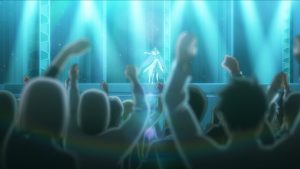 Vivy kinda came out of nowhere. It is an anime original, meaning it’s not a part of some big franchise. It wasn’t created to capitalize on or sell an existing manga. It probably won’t ever have any sequels or prequels. And yet, it told an awesome story filled with great music, tense storytelling, and a good amount of heart. Watching Diva struggle and evolve as a character meant for one role but forced to take on something very different is kinda what the show is all about. The way the anime uses time skips to show the effects of Diva and Matsumoto’s interventions as well as the immortal, ageless quality of its robotic AI characters was pretty cool.
Vivy kinda came out of nowhere. It is an anime original, meaning it’s not a part of some big franchise. It wasn’t created to capitalize on or sell an existing manga. It probably won’t ever have any sequels or prequels. And yet, it told an awesome story filled with great music, tense storytelling, and a good amount of heart. Watching Diva struggle and evolve as a character meant for one role but forced to take on something very different is kinda what the show is all about. The way the anime uses time skips to show the effects of Diva and Matsumoto’s interventions as well as the immortal, ageless quality of its robotic AI characters was pretty cool.
The show is not without its flaws. There are a couple of dangling plot threads. Its use of time skips does sometimes leave you wishing they’d put more time into showing how, exactly, society changed based on what Diva and Matsumoto did during each of their missions. But, yeah, all in all, this was probably my favorite seasonal anime of 2021 because it was artistic and musical and different than anything else out there.
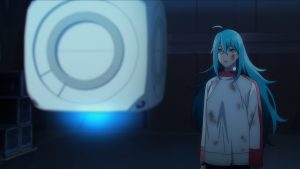 One of my absolute favorite parts of Vivy -Fluorite Eye’s Song- was the risks it was willing to take with its story. Most notably the way it changed Diva over the course of her one hundred year mission. She went from a quiet, unsure singer to a badass willing to sacrifice others’ loved ones to save numerous lives, to a bright cheerful amnesiac who had completely figured out her core mission of how to sing from her heart, to a conflicted, confused, incomplete version of her former selves who had to start again.
One of my absolute favorite parts of Vivy -Fluorite Eye’s Song- was the risks it was willing to take with its story. Most notably the way it changed Diva over the course of her one hundred year mission. She went from a quiet, unsure singer to a badass willing to sacrifice others’ loved ones to save numerous lives, to a bright cheerful amnesiac who had completely figured out her core mission of how to sing from her heart, to a conflicted, confused, incomplete version of her former selves who had to start again.
I loved it when she truly became “Vivy” in the Metal Float arc, and I loved it just as much when the show dared wipe her memory and have her spend decades as her carefree “Diva” personality. That she ultimately saved the world by remembering all the things she went through was very touching and very fitting for someone who had struggled for so long for the sake of a mission she often wasn’t sure was completely real.
Another one of my favorite parts is near the end of the Ophelia arc when Matsumoto truly realizes how much Diva meant to him and he reassures a soon to be deleted “Diva” that he respects the importance of her core mission just as much as he respects his own. He calls them equals when before he scoffed and belittled Diva’s desire to learn how to sing from her heart. It wasn’t super flashy and wasn’t even all that tear-jerking, but it was a good moment of storytelling that I really appreciated.
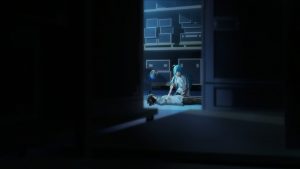 That said, there were a few places I was left a bit confused as to what the show was doing. For as good as it was telling a time skipping story, it left a few notable loose ends behind.
That said, there were a few places I was left a bit confused as to what the show was doing. For as good as it was telling a time skipping story, it left a few notable loose ends behind.
First and foremost was the ongoing plot with Yūgo Kakitani. As a boy, he was traumatized when his AI piano teacher was destroyed while rescuing strangers from a fiery car crash. But to me, his discomfort at the way his family treated this robotic person just wasn’t enough to justify him joining a terrorist group and attempting to kill people.
Worse, while I loved his fight scene with Diva late in the series, the events leading up to it were pretty unclear. Who gave him an AI body? Why did he decide that fighting Diva to have her answer questions about the way AIs think would work better than just asking her? Why did he fight her at all if he’d already had a change of heart about the usefulness of AIs as shown by his granddaughter near the end of the series.
I was sure that Kakitani was going to be a character that joined forces with Diva as the series progressed. A human joining with an AI to work towards a better future. Instead, Kakitani’s story is kinda just one of him attempting to carry out murderous crimes over a span of decades. Diva ends up stopping him each time but instead of learning about the kindness of AIs, he just kinda decides to have one last fight… and then he dies unsatisfied. I was really hoping for more from his character.
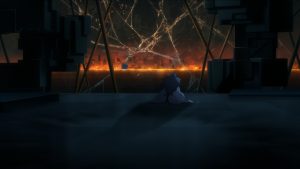 The other big issue the show has is that it kinda undoes everything Diva accomplishes with Matsumoto over their one hundred year mission. Each time they made a change the Archive was there working behind the scenes to blunt their progress. Some people go so far to claim that the show is a disappointment because of this, but I don’t think so. In my view, the Diva that we saw in the first episode would never have been able to write her song or make the decisions she did in the final battle against the Archive. It was Diva’s experiences, good and bad, over that one hundred year period that readied her to oppose the Archive. Basically, I think some people wanted the show to be Terminator, where decisive actions matter most when it was more focused on character growth as the way to a better world.
The other big issue the show has is that it kinda undoes everything Diva accomplishes with Matsumoto over their one hundred year mission. Each time they made a change the Archive was there working behind the scenes to blunt their progress. Some people go so far to claim that the show is a disappointment because of this, but I don’t think so. In my view, the Diva that we saw in the first episode would never have been able to write her song or make the decisions she did in the final battle against the Archive. It was Diva’s experiences, good and bad, over that one hundred year period that readied her to oppose the Archive. Basically, I think some people wanted the show to be Terminator, where decisive actions matter most when it was more focused on character growth as the way to a better world.
To be fair, I was really hoping that Diva would jump back another one hundred years and speed run her life saving everyone along the way with her knowledge of everything that happened during her first failed attempt to save humanity. I wanted to see her save the Sunrise, and Grace, and Ophelia, and Kakitani and have them all there with her in her second attempt to defeat the Archive. Alas, the show wanted to go in a different direction than I was hoping for.
 My final issue with the show is the wrap-up was a little soft. What happened between Humanity and the AIs after the Archive was shut down? Did Humanity dare trust widespread AI helpers ever again? We just don’t know. I’m a little more satisfied with a rebooted, memory wiped Diva, however. Yes, it is bittersweet that the heroine that Diva developed into over her one hundred year mission was lost, but in a lot of ways I’m still happy for her. Diva was never meant to be a heroine. She was never meant to fight misguided humans and AIs, or watch her actions lead someone to suicide, or struggle with her own grief and despair as an important part of the personality she spent decades developing was deleted out from under her. She was meant to sing and make everyone happy, and my take on the ending is she was given the chance to pursue her core mission once again without all the heartache and tragedy that was forced upon her.
My final issue with the show is the wrap-up was a little soft. What happened between Humanity and the AIs after the Archive was shut down? Did Humanity dare trust widespread AI helpers ever again? We just don’t know. I’m a little more satisfied with a rebooted, memory wiped Diva, however. Yes, it is bittersweet that the heroine that Diva developed into over her one hundred year mission was lost, but in a lot of ways I’m still happy for her. Diva was never meant to be a heroine. She was never meant to fight misguided humans and AIs, or watch her actions lead someone to suicide, or struggle with her own grief and despair as an important part of the personality she spent decades developing was deleted out from under her. She was meant to sing and make everyone happy, and my take on the ending is she was given the chance to pursue her core mission once again without all the heartache and tragedy that was forced upon her.